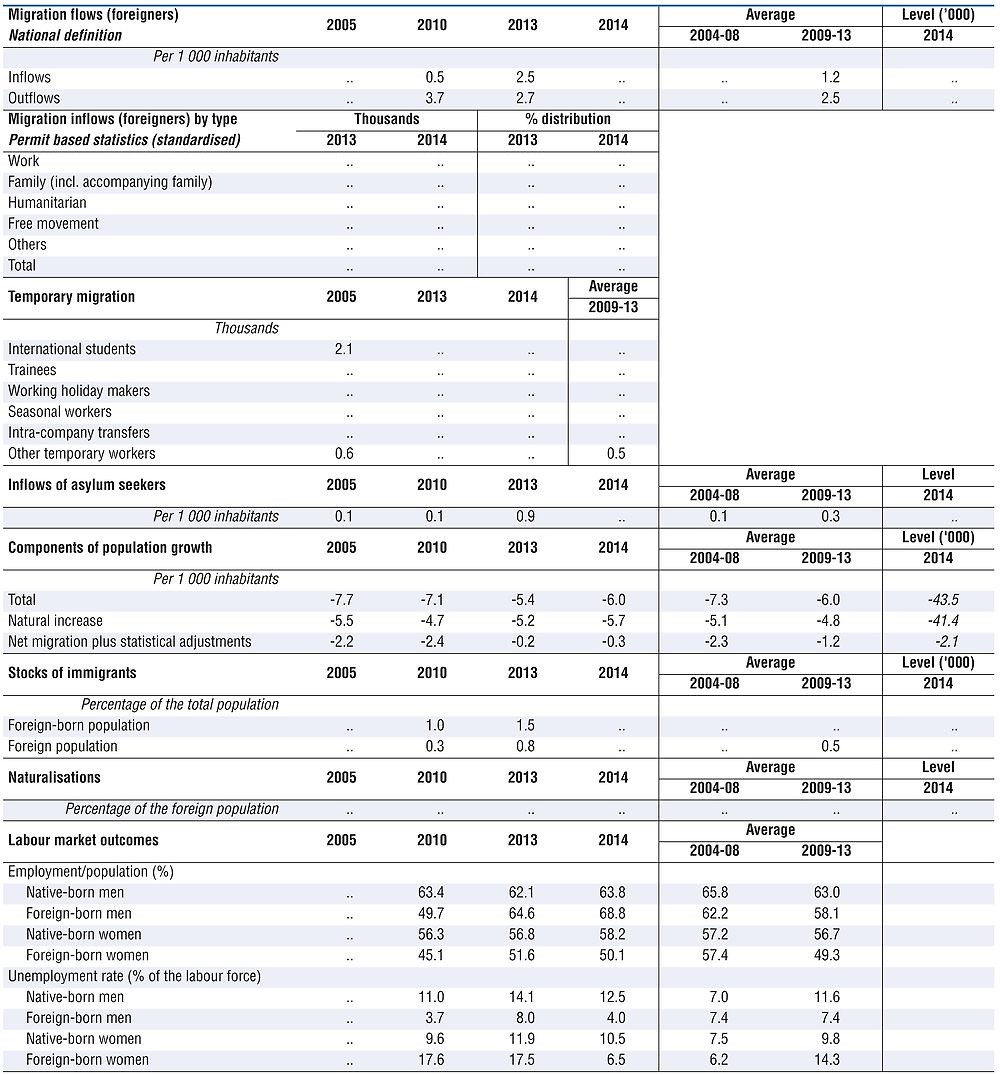Bulgaria
In 2014, both immigration and emigration flows increased, resulting in a net emigration of 2 100 persons. Net emigration of Bulgarians (-14 300) was not fully compensated by a net immigration of foreigners (+12 200). However, these figures – based on registered changes of permanent residence – may underestimate the true scale of migration flows. The number of foreigners entering (of whom nine in ten were non-EU citizens) increased from 13 900 to 17 100 between 2013 and 2014, while emigration flows increased by 33% to 4 900. The top three origin countries of foreign immigrants were Turkey (predominantly students), Syria (mainly asylum seekers) and the Russian Federation. Emigration of Bulgarian citizens rose by nearly 50% to 23 900. This flow is primarily labour migration of short and medium duration.
A record level of 124 800 foreign-born persons were residing in Bulgaria in 2014, representing 1.8% of the total population compared to 0.5% three years earlier. Among other factors, the country’s mem-bership in the EU and active policy measures to attract ethnic Bulgarians from abroad have likely played a role in this increase. Recent years have seen an increase of flows from countries where Bulgarian minorities are settled, as well as from other EU countries. EU citizens accounted for more than a third of the foreign-born population. Greece, the United Kingdom and Germany were the main origin countries of EU citizens in Bulgaria as well as the main destinations for Bulgarian emigrants.
The labour market situation in Bulgaria is still weak and labour demand has been shrinking. This likely contributed to a decline in the inflow of foreign workers. In 2014, less than 300 new work permits were issued, the lowest number since 2005; 300 work permits were renewed. However, posted workers and those employed in tourism are often exempt from the requirement of a work permit. Chinese and Turkish skilled workers constituted the largest groups.
The number of foreign students enrolled in the academic year 2014/15, at 11 500, remained stable compared with the previous year (4.3% of the total). Students from neighbouring countries and countries where Bulgarian minorities are settled (citizens of Bulgarian origin have free access to universities in Bulgaria) represented more than 80% of the total stock of foreign students. According to the national statistical institute, 27 900 Bulgarian students were studying abroad in 2014/15, representing around 10% of the number of students in Bulgarian universities. Their preferred destination countries were the United Kingdom and Germany, followed by Austria, France, Spain and the Netherlands.
There were 20 200 asylum applications in 2015 (including dependents), i.e. 1.6% of the applications received in the EU28. This number nearly doubled from that of 2014. The top three nationalities (Iraq, Afghanistan and Syria) accounted for more than two-thirds of total applications. More than 90% of the 5 600 decisions made at first instance in 2015 were positive, compared with 51% in the EU28. Migration pressure, mostly at the Bulgarian-Turkish border, intensified in 2014. The construction of a 30 km fence, as well as repeated interventions by the Bulgarian Border Police, resulted in a temporary slowdown of illegal border crossings, from 11 600 in 2013 to 6 500 in 2014, with the majority of these persons coming from Syria and Afghanistan.
To encourage foreign direct investment, a new simplified procedure has been put in place to grant permanent residence permits and citizenship to entrepreneurs from third countries who invest more than defined thresholds.
Changes to the Law on Bulgarian Citizenship stipulate that foreign citizens permanently residing in Bulgaria through marriage to a Bulgarian citizen, as well as EU citizens and citizens from countries that signed a reciprocity agreement with Bulgaria, may acquire Bulgarian citizenship without renouncing their former citizenship.
September 2015 saw the adoption of new amendments to the Refugee Law that transpose the Directive 2011/95/EU concerning the standards that qualify third-country nationals or stateless persons for international protection. The law introduces a new category, “temporary international protection”. This status will be granted in the case of a massive inflow of persons who are forced to leave their country of origin due to military conflict, civil war, foreign intervention, violation of civil rights, or violence within its territory. The government has also proposed introducing a simplified procedure for granting refugee status to ethnic Bulgarians victims of conflicts or civil wars.

